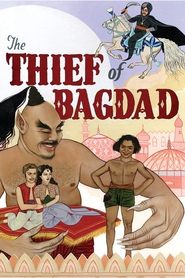Another film that, upon watching it for the first time, I finally see how much of Steven Spielberg and George Lucas' imagery was, in reality, purloined from the archives of classic cinema: Indiana Jones hiding in the baskets in the 'Arab' market was surely taken from The Thief of Bagdad, as well as stone doors that close vertically that trap Indy into a room full of cobwebs and skeletons… Even John Williams' entire career has something of Miklós Rózsa's soundtrack about it. And although I say 'soundtrack' there, as someone put it somewhere, more of a symphony that happens to be accompanied by a movie, rather than the other way around.
Yet this doesn't remind me as much of Indiana Jones… or The Wizard of Oz (1939) or even Disney's Alladin (1992) than it does The Adventures of Robin Hood (1938): it is as culturally reductionist; as morally monochrome; as much of a romanticisation of a 'faraway' culture; as entranced by the majesty of 'true' monarchy; as entrenched in the moral worth of folklore... and yet, just as charming, if not more. A children's movie that isn't childish.
Well worth reading is Andrew Moor's Criterion Collection essay, which wryly connects the film with "Britain’s Jaffar-like influence over the infant state" of Iraq, asks whether the genie is "paradoxically enslaved to the small child who liberated him?" (referencing black American actor Rex Ingram) and that:
For all its fantastical register, then, this is not simply innocent fantasia, because it is working through ideas about political leadership that are colored by centuries of interaction between West and East, and between leaders and the led.
Moor is also good on the monarch aspects:
A rightful leader wrongly deposed and learning through his experiences among the commoners that his people can be trusted but his vizier could not: about as succinct an endorsement of democratic monarchy as we could wish, and this from a nation [ie. Britain] whose royal family had recently been rocked by abdication and whose eyes were squarely facing the rise of totalitarianism in Europe.
… and also on the sexual undercurrents:
David Lean’s Lawrence of Arabia (1962) explores similar territory and opens up the subtextual possibility that the disempowerment of the white male Westerner is not just an unwanted danger; it might be an unconscious desire, masochistic, (homo)sexualized, and/or coming from a sense of imperial guilt. […] We see Ahmad imprisoned, chained, sentenced to die, and memorably blinded by Jaffar’s spell—symbolic castrations at the hands of a more powerful man who is his usurper in government and his rival for the love of a princess. The narrative clearly needs Ahmad to suffer, to plow the depths, before he can win back his palace. That is his “character arc.” But because Ahmad is played so obviously by a white man, he has to be seen alongside other British men of empire suffering abroad and losing their tenacious grip on brittle Western masculinity.

